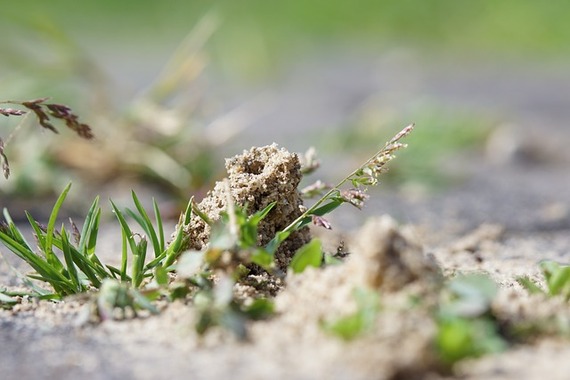Yesterday I spent some quiet time observing the shores of a local lake. On the sandy beach I noticed lots of small anthills in an otherwise barren landscape. I asked myself how ants survive in an environment that would kill me in no time. Similarly, there's no way I could extract nutrients from the wet sand as the common buckeye butterflies were doing. When I ponder the thousands of organisms making a living on and from that barren habitat, I realize how small I am in the order of things and how little I really know or understand. I felt humbled. I think humility should serve as the cornerstone of any effective environmental action.
We have asked our contemplative group to spend time outdoors these last couple of weeks appreciating the creatures (rocks, plants, animals, clouds...whatever) they encounter, and then respecting and revering the deep presence of God within them. We come to see the pattern of barks and the shape of leaves on the tree we pass by everyday. The ants that we don't usually bother to notice take on a deeper significance and importance to us. This process of respectful attention helps us to truly see our neighbors and to get to know them, appreciating them for what they are. We come to value our pets for their cat-ness or dog-ness rather than for the human qualities we may project onto them.
Valuing and respecting others for who they are rather than for what we think they are or what they can do for us is one aspect of humility. If we realize we're not the center of the universe, then we also come to realize that all other creatures, both human and nonhuman, share the stage with us. They matter because they have an intrinsic value. They matter in and of themselves because God made them, too. They aren't important or unimportant because of what we think about them. Coming to this realization puts our place in the universe into proper perspective.
Applying this process to ourselves leads us to realize that we, too, have great abilities and weaknesses. We see ourselves for who we are with all our warts and beauty and accept that, just as we have come to do with our neighbor creatures. All too often we equate humility with self-effacement or even self-denigration or self-denial. Rather, humility involves a hard-nosed realism that sees our strengths and weaknesses and accepts them as integral aspects of who we are. We don't give up trying to overcome our weaknesses, but rather recognize them with compassion and patience, turning to the Spirit and asking it to transform them into new strengths.
Compassion and Community
As I spent time outside a couple days ago with fungi and trees, recognizing my smallness and their amazing abilities, I found that I felt a growing sense of com-passion and comm-unity, a sharing of their passions and a discovering of our commonality in the one great household of God. Just as I rely on farmers and steelworkers to provide me food and shelter, I rely on fungi to break down fallen tree trunks and to make nutrients available to crops, and on trees for air, water and wood. I started to recognize that I and other creatures share common struggles to survive and prosper. In many ways although we're different, we have a lot in common, just as like humans in their communities. Growing in humility before my fellow creatures helps me recognize the value of the many humans who constitute our communities.
In many ways humility should serve as a cornerstone of environmental action. We can do all the right things for the wrong reasons and come up short. Doing the right things without loving compassion and solidarity all too often leads us down the road. There can be no "right thing" unless it proceeds from an underlying love for those we are trying to help. And love requires face-to-face encounter. If we don't know people who lack access to food and shelter, we may enact policies that worsen their situation and demean them as people. We can't love the poor in the abstract. Nor can we love "the environment." We need to get to know our little neck of the woods and develop a humble communion with it. Once we at least learn to love one place we have the possibility of loving others and acting out of thoughtful solidarity with them.
Humility leads us to realize that others, whether human or nonhuman, may have something to teach us and that we ought to listen to them when we debate pollution or land use policies. It prods us to get our hands dirty and to get to know the people and natural communities affected by our actions, to listen attentively to both before we act on their behalf. It causes us to give pause before we turn on the lights or turn up the ac, or to throw the McDonald's trash out of our car window. Humility moves us to seek alternative ways of organizing ourselves to confront common concerns so that all parties have a voice and so that we can learn from one another and serve them. Humble people collaborate and build bridges. What a radical notion....

